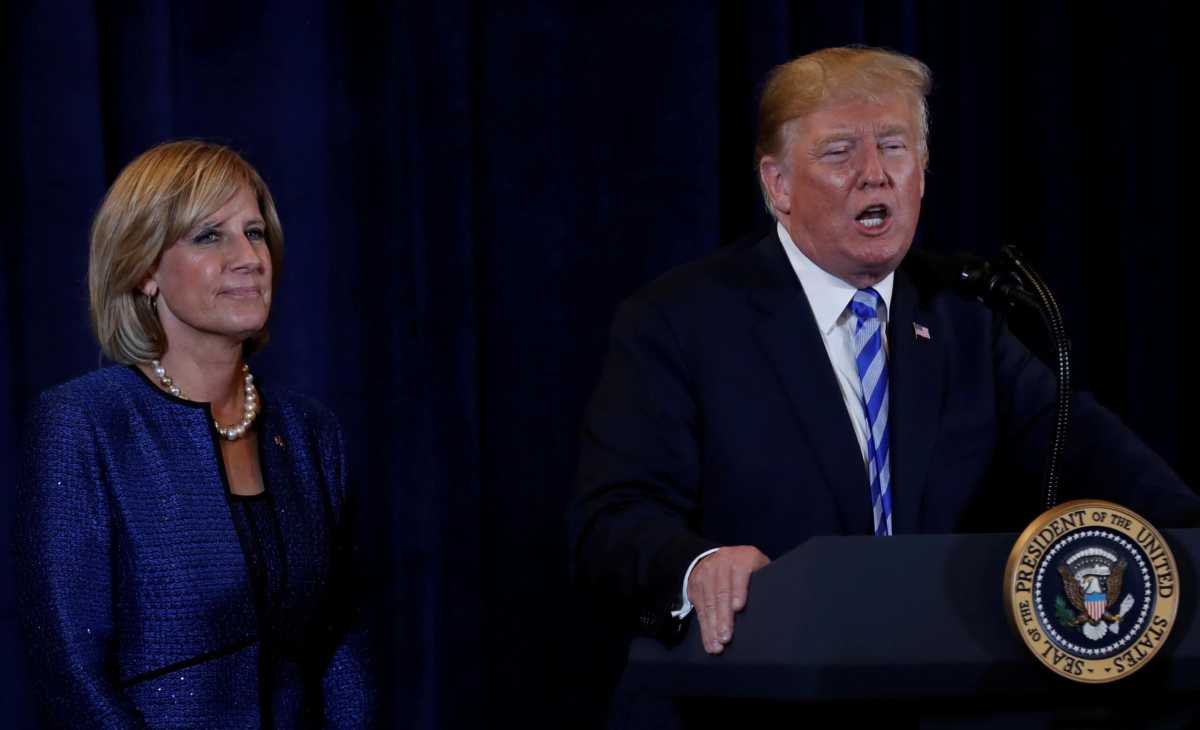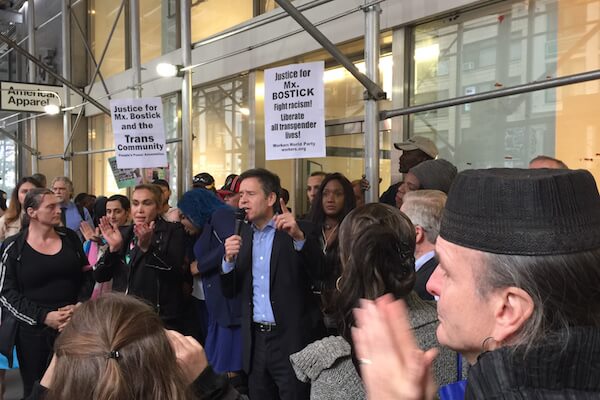Two years after anti-LGBTQ GOP Congressmember Claudia Tenney was unseated in upstate New York, she wants her old job back — and she’s got the support of President Donald Trump to help resurrect her career.
Tenney, a former state assemblymember who spent just one term on Capitol Hill, is back for a November rematch after she lost by just over 4,000 votes, or less than two percentage points, to Democrat Anthony Brindisi in the 2018 midterm elections that saw Democrats regain control of the House of Representatives.
Now, as Democrats aim to expand their advantage in the lower house and recapture the Senate and White House, Tenney is again aligning herself with Trump — who is so tight with her that he made a rare trip to Utica in 2018 when the pair headlined a fundraiser together. On the front of her campaign site, Tenney asks supporters to “help Claudia restore conservative leadership in Congress and support President Trump’s Great American Comeback.”
Swampy Republican lawmaker with long list of anti-LGBTQ stands mounts comeback bid
Tenney and Trump’s partnership is not surprising, after all. They both have a history of denigrating racial minorities and opposing LGBTQ rights and reproductive rights.
In fact, while Trump has imposed explicitly transphobic policies across numerous federal agencies within his administration, Tenney’s record includes voting against same-sex marriage rights in the Assembly and opposing legislation banning discrimination on the basis of gender identity or expression.
As a sitting congressmember, Tenney also made bizarre, baseless comments about transgender seniors playing golf and referred to trans individuals as “transgendered.”
“When it gets into dealing with sports and people — my aunt, she played golf her whole life, she can’t win the state seniors because there is a new person who is transgendered… who is going to win,” Tenney told Colgate University’s weekly newspaper, The Colgate Maroon-News, in 2017. “Those are the things where I’m like: are we destroying Title IX or are we preserving it?” (Title IX, which bars sex discrimination in publicly funded educational institutions, has no bearing on sports outings by senior citizens.)
To her credit, Tenney voted against Trump’s ban on transgender service members, but that vote featured a glaring caveat and she again used off-putting language to refer to transgender individuals. She said during a 2018 debate that she was “one of the few people that supported the transgenders in the military,” but later qualified that comment by saying she “thought it was something that should be left up to General [James] Mattis, our secretary of defense, in pursuing that policy,” according to the Utica Observer-Dispatch.
Furthermore, Tenney once criticized the late Congressmember Richard Hanna, who was known as a political moderate, for becoming a member of the House LGBT Equality Caucus, according to Syracuse.com. Tenney unsuccessfully challenged Hanna in the Republican primary in her first run for Congress in 2014.
It’s clear that anti-LGBTQ political forces have viewed Tenney as a reliable ally. During that 2014 campaign, she was endorsed by the political action committee of New Yorkers for Constitutional Freedoms, a statewide evangelical Christian advocacy organization that praised her for having “taken consistent, principled stands by voting against the SAFE Act, late-term abortion expansion, same-sex ‘marriage,’ medical marijuana, and taxpayer funding of campaigns.”
It should come as no surprise, then, that Tenney has voted many times against abortion rights, and her hostility to reproductive freedom has yielded endorsements from anti-choice organizations in her current campaign, such as the Susan B. Anthony List.
Those groups were undoubtedly pleased to see Tenney recently touting the Supreme Court nomination of far-right Seventh Circuit Court of Appeals Judge Amy Coney Barrett to the United States Supreme Court. Spectrum News reported that Tenney described Barrett last month as “a committed constitutionalist who will follow the law to ensure justice is done, not legislate from the bench.”
Those blemishes, meanwhile, stand in contrast to Tenney’s opponent, incumbent Brindisi, who co-sponsored the comprehensive LGBTQ non-discrimination legislation known as the Equality Act passed by the House last year and was endorsed this year by the Human Rights Campaign in his re-election bid.
Tenney’s record on other issues is full of red flags, as well. She once published a shamefully racist tweet targeting Oneida Indian Nation Representative Ray Halbritter, calling him “Spray Tan Ray,” and she initially appeared to defend Trump’s “very fine people on both sides” rhetoric after white supremacists marched in a horrifying Unite the Right rally in Charlottesville, Virginia, in 2017. After Trump faced public condemnation for defending white supremacists, Tenney said that it was “insane that we are splitting hairs over this stuff.”
Under intense pressure, she later scrambled to clean up her comments when she, according to the Rome-Sentinel, urged the president “to continue to denounce white supremacy” — as if he had been doing so all along.
Among other issues important to LGBTQ constituents, Tenney has spent years railing against the Affordable Care Act — a politically-risky move in a district that boasts a higher poverty rate than the rest of the state and even the nation. She voted in favor of Trump’s 2017 legislative effort to repeal Obamacare, though that bill was eventually foiled in the upper house when ailing Senator John McCain of Arizona returned to Washington and cast a pivotal vote that ultimately saved the Affordable Care Act.
The issue of healthcare emerged as the catalyst behind the Democrats’ successful bid to regain control of the House of Representatives in 2018 — the same year Tenney was booted from her seat.
Tenney, however, does not appear to have learned lessons from that defeat. She is again pushing against Obamacare during her current campaign, even as her party has failed to present any alternative healthcare approach. The economic challenges faced by her former constituents would be immeasurably compounded by the loss of the the ACA’s pre-existing condition protections.
Tenney has also fallen in line with Republicans in dismissing the realities of the coronavirus pandemic. When a Twitter user recently pointed to the fact that more than 200,000 Americans have died of coronavirus, Tenney replied, “Getting tired of this Democratic talking point.” She later deleted the tweet, but suggested in an interview with WIBX 950 AM that some of those deaths could actually have been caused by car accidents.
Tenney shouldn’t be so certain that her Trump ties will amount to a winning strategy — even in the 22nd Congressional District, which includes large swaths of rural territory and extends vertically from the southeastern corner of Lake Ontario down to Binghamton and New York’s Southern Tier. Tenney won by just four percentage points in 2016 and, after losing her seat in a blue wave, is standing by a president who is trailing in national polls and in most battleground states that will help determine the winner of the election. Fivethirtyeight.com has all year given former Vice President Joe Biden a 99 percent chance of carry New York State.
If those trends are borne out on November 3, Tenney could find herself in big trouble all over again.
Tenney’s campaign did not respond to a voicemail message seeking comment on October 23.
To sign up for the Gay City News email newsletter, visit gaycitynews.com/newsletter.




































